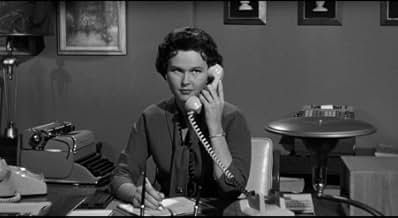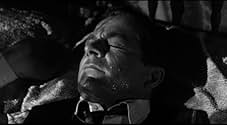Ajouter une intrigue dans votre langueA Korean War veteran returns to Washington D.C. only to discover his business partner had died and their public-research business sold, so he works there undercover to find out the truth.A Korean War veteran returns to Washington D.C. only to discover his business partner had died and their public-research business sold, so he works there undercover to find out the truth.A Korean War veteran returns to Washington D.C. only to discover his business partner had died and their public-research business sold, so he works there undercover to find out the truth.
- Barney Bond
- (as Mel Torme)
- Col. Buchane
- (scenes deleted)
- Man Speaking in Conference Room
- (uncredited)
- Police Sergeant Dispatcher
- (uncredited)
Histoire
Le saviez-vous
- AnecdotesThird and final collaboration between Dana Andrews and director Jacques Tourneur, who were good friends in real life. The first was the Western, Canyon Passage (1946), followed by the horror classic Rendez-vous avec la peur (1957) (Night of the Demon).
- GaffesAlan Eaton is depicted as flying in three different airplanes on his flight to Washington, D.C. at the beginning of the film. First is an obvious model of a Lockheed Constellation (L-049 or L-749) with round windows. Next, as seen from inside and outside is a Lockheed Super Constellation (L-1049) with square windows and a white nose. Lastly, when the airliner lands it is a Lockheed Starliner (L-1649A) with a black nose.
- Citations
Alan Eaton: You know, Lorraine, you're not only very kind... you're very lovely.
Lorraine Dennis: [Breaking into a big smile] I thought you'd *never* notice!
Everything about the movie is just what one would expect from an inexpensive thriller from the era, and that's not bad at all. Probably the most appealing character is played by Mel Torme (Andrews is much too surly - and for good reason - to capture audience sympathy), a number-cruncher who remains oblivious to the moral implications of the data he is massaging for his employers. His best moment comes when he picks EXACTLY the wrong moment to strike up a conversation with Marilee Earle; the audience knows she can't possibly tear her attention away from a task she has been sent to perform, but we all know how it feels to want to break through another person's preoccupation.
Thematically, the film bites off more than it is prepared to chew. The premise (that some distinct group may control a substantial part of the information we Americans receive every day) is both disturbing and plausible. We do our best to make sure that no single source can exert too much power over information, but we can never be sure just how much of the data we believe to be factual, is actually cooked up by people with an agenda. Exposing one conspiracy (as seen in The Fearmakers) does not stamp out all such conspiracies at once, and the film offers no hint of assurance that the public will be any wiser, the next time information is manipulated. One may extrapolate that there is a terrible danger in trusting ANY source of information, but no solution is suggested.
A minor disappointment comes from another important topic that is introduced at the beginning and then thrown away: Eaton's brainwashing. He has apparently been subjected to gruelling torture and mind control in the recent past, but it has no effect at all on his behavior except to make him grumpy and subject to sudden headaches. Basically, this is used as a plot device which allows the bad guys to get the upper hand at times, but nothing in the story really turns on it. Perhaps after seeing The Manchurian Candidate, one's expectations are set too high; certainly one can't fault the scriptwriters, as the novel had not yet been published.
The most unfortunate aspect of the movie is that a 1950's happy ending is predetermined. By the 1970's, filmmakers would be comfortable creating conspiracy stories with darker endings, and today it is difficult for viewers to accept a movie in which a problem like this one is completely solved. By current standards, the last few minutes of The Fearmakers are dreamlike and childish...and perhaps this explains some of the film's charm. I'd love to see a remake of the movie, set once again in the 50's, nearly identical right up to the end, and then have Alan Eaton wake up to discover that the conspiracy has NOT been neatly wrapped up at all. It's enjoyable to imagine a finale in which he runs, Kevin McCarthy-like through Washington DC, grabbing away people's newspapers and shouting "Where do they get their facts? Where do they get their numbers?" Who knows? Seems like they're making a lot of remakes these days, and this one would be do-able with a small budget...
- PaulCurt
- 6 sept. 2001
- Lien permanent
Meilleurs choix
- How long is The Fearmakers?Propulsé par Alexa
Détails
- Durée1 heure 25 minutes
- Couleur
- Rapport de forme
- 1.37 : 1
Contribuer à cette page
































